State lawmakers will return to Jefferson City next week for a special legislative session. Governor Eric Greitens (R) is calling them back to address an economic development issue in Southeast Missouri.

The legislature did not pass in its session that ended last week language that backers say could allow one company to proceed with plans to reopen the Noranda aluminum smelter at Marston; and another company to build a new steel mill at New Madrid, both in Southeast Missouri.
Both companies hope for lower utility rates that would allow those facilities to be profitable. To consider lower rates the Public Service Commission (PSC) says it needs the legislature’s approval.
Representative Don Rone (R-Portageville) attached that language to several bills in the final days of the session, but it did not become law. He said people in that region are in desperate need of jobs, especially after Noranda closed last year eliminating nearly 900 jobs. He said these two projects could create more than 500 new jobs.
Greitens wants legislators to come back and focus on that one issue.
“I cannot thank the governor enough for the people of Southeast Missouri – all of Southeast Missouri,” said Rone. “I can’t tell you what it means to these people here to have hope, and the governor saw fit to give us hope by calling a special.”
The House voted for Rone’s language 148-2, and its support in that chamber is expected to remain high, but at least one senator who Rone said blocked it in that chamber – Senator Doug Libla (R-Poplar Bluff) – remains opposed to the proposal.
Rone said he believes the bill can get through both chambers and to Greitens.
“[Senator Libla] can keep his position. We’ve never asked – in the many conversations I’ve had with him and his people – we’ve never asked him to change his vote. We’ve always asked him just to allow it to come to the floor and let the people in the Senate vote,” said Rone. “All we’re wanting to do is let democracy work, let the 34 senators take vote their conscience, and see where it takes us.”
Rone said the entities behind the two facilities are expected to decide soon whether to give up on progressing with their plans for those two sites. He said if the legislature can quickly pass his bill he is confident those companies will postpone their decisions until they can meet with the PSC.
“I would think that [Governor Greitens] was well aware of the timeline and how critical it is,” said Rone.
The call for the special session comes one week after Rone called attention to the issue in a passionate floor speech in which he called out Libla and two other senators, saying they were, “heartless,” “selfish,” and “egotistical,” in rebuffing his proposal.
The House and Senate will begin the extraordinary session at 4 p.m. Monday.
